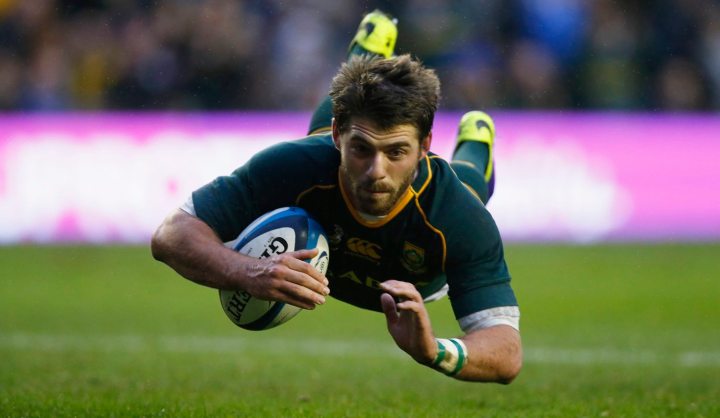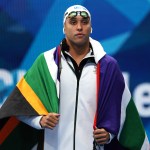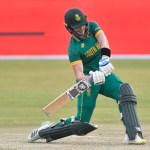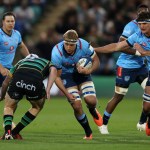Sport
Rugby: Scotland’s brave fight wasn’t enough

The Springboks produced some moments of brilliance and also some sloppy times, but the overall impression was of a team that simmered without coming to the boil in their 28-0 win over Scotland at Murrayfield on Sunday night. By KEN BORLAND.
Scotland is bearing the early brunt of icy weather that is sweeping through Britain in what is being described as a two-week cold snap, and the persistent rain certainly did not make life easier for the Springboks, no matter how dominant they were.
Neither did another poor pitch, which cut up badly thanks to a nematode infection that has killed the roots of the grass. And credit must be given as well to the Scottish defence, which scrambled brilliantly and was particularly impressive with their gang-tackles at close quarters.
But Scotland clearly have little else to offer except bravery against a team as powerful and skilful as the Springboks.
Nevertheless, the South Africans will be content that they scored four tries and will be especially pleased that they did not allow Scotland to score a single point, despite the home side having 70% of possession in the second half, and Marcell Coetzee’s yellow card meaning the Springboks played the last nine minutes with just 14 men.
The Springboks have now gone 160 minutes without conceding a try and clearly the improvements in their attacking play have not been at the expense of the defensive prowess so expertly engineered by John McFarland.
South Africa have rarely shown such precision in terms of ball-retention as they did in the first half against Scotland. The statistics this generated were quite extraordinary: After 12 minutes, the Scots had made 41 tackles and the Springboks just five. Ten minutes later, that stat was 51 against nine and, in terms of gainline success, South Africa were leading 31-0, meaning Scotland had not managed to get over the advantage line once in the first quarter.
But the Springboks were still just 7-0 up, thanks to the opening try by Willem Alberts after the visitors had kept the ball for a solid four minutes after Scotland returned the kickoff. The home side defended stoutly – their gang-tackling making an early impression – but they eventually cracked and went offsides. But Jean de Villiers chose not to go for poles and instead instructed Pat Lambie to kick for touch.
Duane Vermeulen won the throw at the back and the rolling maul was being set when the ball was cannily shifted to Alberts at the front, who thundered over the line with prop Gurthro Steenkamp on his back.
It was as emphatic a start as one could wish for but, just to prove I am not a toadie for the subdue-and-penetrate, 10-man rugby the Springboks sometimes lapse into, yesterday was an ideal opportunity for them to give the ball a little more width.
As formidable as the Springbok ball-carriers are rumbling on to Fourie du Preez’s deft pop-passes from the base of rucks, Scotland barely gave an inch as they employed two of their big, brave men to tackle them. South Africa’s attack was too narrow and, given how the home side were concentrating their resources, having some runners further out, off flyhalf or even the centres, would have provided more try-scoring chances.
The disintegration of the Scottish lineout – Flip van der Merwe, Vermeulen and Bakkies Botha all making steals in the opening quarter – added to the woes of the home side, but for all the territorial dominance of the Springboks, they were still just 7-0 up after half-an-hour.
It took the magic of Willie le Roux to convert that dominance into points on the scoreboard in the last 10 minutes of the first half.
Scotland were actually enjoying their first real attack of the game when South Africa’s effective outside-in defence forced them to try and go wide quickly, the move broke down and Le Roux pounced on the loose ball, running clear to score from 55 metres out.
Lambie converted and the Springboks then won the kickoff. Le Roux was at first-receiver and he stepped inside and through a gaping hole in the Scottish defence, again bursting clear from his own half. His wonderful vision was obvious as he then took the cover-defence out of play with a crosskick which right wing JP Pietersen had the pace to get to first and the finishing skill to dot down.
Lambie nailed the angled conversion (admittedly off the crossbar) and the Springboks led 21-0 at the break, the Scots seemingly ripe for the slaughter in the second half.
But the home side were an improved outfit after the break, hanging on to the ball better and the concentration of the South Africans’ began to waver – especially at lineout time – as the substitutes were brought on by coach Heyneke Meyer.
Despite Scotland dominating the territory and possession stats in the second half, the Springboks still scored the only points of the last 40 minutes.
The Scottish were piling on the pressure inside the South African half but a turnover saw the ball go quickly wide to wing Bryan Habana, whose dash and kick ahead forced a five-metre lineout. Vermeulen again leapt high to take the ball and the Scots suffered the embarrassment of falling for the same move again as the ball was shifted to replacement prop Coenie Oosthuizen, who crashed over for his second Test try.
The Springboks weren’t helped thereafter though by replacement flank Coetzee’s sin-binning for slowing the ball down at a ruck and, shortly thereafter, fellow loose forward Francois Louw left the field.
The Bath openside showed the skill of a pickpocket at the breakdowns, but was then the victim of a clean-out that was more like the mugging of a little old lady by Scotland lock Jim Hamilton. Louw was bound into a ruck, with his face totally vulnerable, when Hamilton charged in and hit him on the head and neck with his shoulder.
Louw was knocked unconscious and stretchered off after a lengthy delay, while Hamilton’s illegal clean-out escaped further examination.
At the very least, he was guilty of the same offence as Bakkies Botha was suspended for against the British and Irish Lions in 2009, i.e. not using his arms to clear out a ruck. But just as our government turn a blind eye to the excesses of Robert Mugabe, but clamp down violently on service-delivery protests at home, so the IRB’s officials tolerate acts like Hamilton’s, which are far more dangerous than tip-tackles, but are quick to pounce on the slightest bit of extra physicality from a Bakkies Botha or Bismarck du Plessis.
Louw was at least smiling giddily and able to give a thumbs up as he was stretchered off.
The former Western Province player makes such a difference with his presence on the ground, but the good news for the Springboks, looking ahead to their huge clash against France next weekend, is that Vermeulen also makes frequent turnovers.
In fact, a verb probably doesn’t exist to fully describe the eighthman’s all-action, all-round brilliance against Scotland. The 27-year-old was an explosive ball-carrier, tackled ferociously, soared high in the lineouts and even made his presence felt at the breakdowns.
Le Roux once again showed how valuable he is as an attacking barb in the backline, but he also produced a very solid all-round display at fullback – strong in the air and kicking well too.
Apart from the successful result, Springbok coach Heyneke Meyer will also have a better idea where the likes of Pat Lambie, Bakkies Botha, Gurthro Steenkamp and Coetzee stand in his long-term plans.
Botha began the game as if the 2007 World Cup was only yesterday, getting around the field and having his usual physical impact, although he did fade later and was replaced on the hour mark. But as back-up to Eben Etzebeth, they don’t come any better or as experienced.
Lambie was solid at flyhalf as both a kicker and a distributor, while Coetzee came on at the start of the second half for Alberts and played as a hybrid blindside/openside flank. He certainly made his presence felt, until his moment of silliness in pushing French referee Jerome Garces too far at the breakdown.
Loosehead Steenkamp also played a full part in the Springboks’ dominance of the collisions and, even though he is 32, Meyer can look to him for 2015 and a third World Cup appearance for the Toulouse-based prop.
Scrumhalf Du Preez had another strong game and it was noticeable how South Africa’s tactics became muddled once he was replaced in the second half.
Murrayfield has not been the easiest of venues for the Springboks in recent years and they had lost there in 2010, sandwiching narrow wins in 2008 and last year. But this is obviously a Springbok team that is rapidly growing into a formidable outfit. Their composure and focus at the start of the game was in stark contrast to the nervousness of the Scots, despite a raucous crowd egging them on.
The precision of the Springboks in the opening quarter silenced the crowd and ensured the end-result was always going to be obvious. DM
Photo: South Africa’s Willie le Roux scores a try against Scotland during their rugby union match at Murrayfield Stadium in Edinburgh Scotland, November 17, 2013. REUTERS/Russell Cheyne



















 Become an Insider
Become an Insider